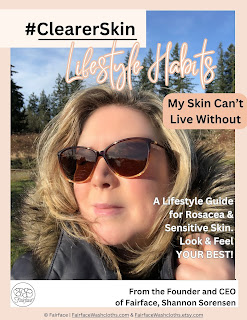Finding the right products that are gentle enough and not irritating for such reactive skin can be a long, frustrating journey through trial and error.
Because I have gone through all of this myself, I decided that a great way to offer help, for us sensitive skin and rosacea types, was to create a series of helpful Skin Care Guides to help take some of the guess-work out of finding the right products and at least give you a proven sensitive skin care routine as a great place to start.
I hope so much these resources can be a huge help for you and your rosacea and/or sensitive skin!
First up, the best skin care routine I have found to support my sensitive rosacea-prone skin:
My "Dream Team" Skin Care Routine for Sensitive Skin & Rosacea - Instant Digital Download
In our New Digital Skin Care Guide for Sensitive Skin & Rosacea, I share my entire step-by-step sensitive skin & rosacea skin care routine, including:
- My morning cleansing, moisturizing and protecting routine
- Each step of my nighttime skin care routine
- Each product I use, why I use them, how and when I apply them and why I love them (including one product that might surprise you!)
This tride and true rosacea and sensitive skin care routine has helped my skin stay clean, clear and calm for many years. I don't have to worry about products causing redness, irritation or rosacea flares because each of the products I use are gentle and protective.
More helpful resources for Rosacea:
There are so many things that contribute to keeping my skin clearer and more calmer, when it comes to Rosacea and Sensitive Skin. I have lived with Rosacea for 14+ years and it's taken me a lot of trial and error to come up with lifestyle habits that support my skin in the best ways.
This coloful-magazine-style 28 page pdf is full of all the things I do that help to keep my rosacea prone sensitive skin looking and feeling its best with many more days of clear, calm skin. I hope it can help you too!
See what it's all about!
Ocular Rosacea Eye Care Guide: Soothing Tips & Remedies for Ocular Rosacea -Instant Digital Download
Rosacea doesn't only affect the skin, it can also affect our eyes, causing symptoms like itching, burning, redness and dryness. Ocular Rosacea can also make it particularly challenging to wear contact lenses.
I have dealt with dry eye issues (and contact lens related discomfort) related to Ocular Rosacea, for years. It wasn't until I met with my Ophthalmologist on a regular basis and started to put the tips and remedies he suggested into regular practice, that my dry eye symptoms began to ease. His suggestions have helped me so much that I wanted to share them with you and I hope you find them helpful for you as well!
Our Soothing Tips & Remedies for Ocular Rosacea Digital Guide is another helpful resource for those with Rosacea to find relief from dry eye and other eye-related symptoms, as recommended by my Ophthalmologist.
Additional Helpful Guides for Sensitive Skin and Rosacea are coming soon! Here is a full list of the titles either currently available or coming soon:
- Dream Team Skin Care Routine for Sensitive Skin & Rosacea
- Soothing Tips & Remedies for Ocular Rosacea
- Clearer Skin: Rosacea & Sensitive Skin Lifestyle Habits I Can't Live Without
- Travel Tips for Rosacea and Sensitive Skin
- Beach List for Rosacea and Sensitive Skin
- Rosacea & Sensitive Skin Fails: Skin care products that didn’t work for me
- My Invitro - Rosacea Connection
About the Author: Shannon Sorensen is the Founder and CEO of Fairface, makers of the best soft washcloths for sensitive skin. As an advocate for those with sensitive skin and rosacea, she created this new line of Skin Care Guides for Sensitive Skin and Rosacea as an additional resource to help those with sensitive skin conditions feel less alone and have the best tools and information to care for their skin.
DISCLAIMER:
The opinions and ideas expressed in these guides are my own, including recommended tips from my licensed skin care and eye care providers. These digital guides are intended for informational purposes and do not replace professional medical advice. Always consult a healthcare or eye care professional for personalized guidance and treatment.



